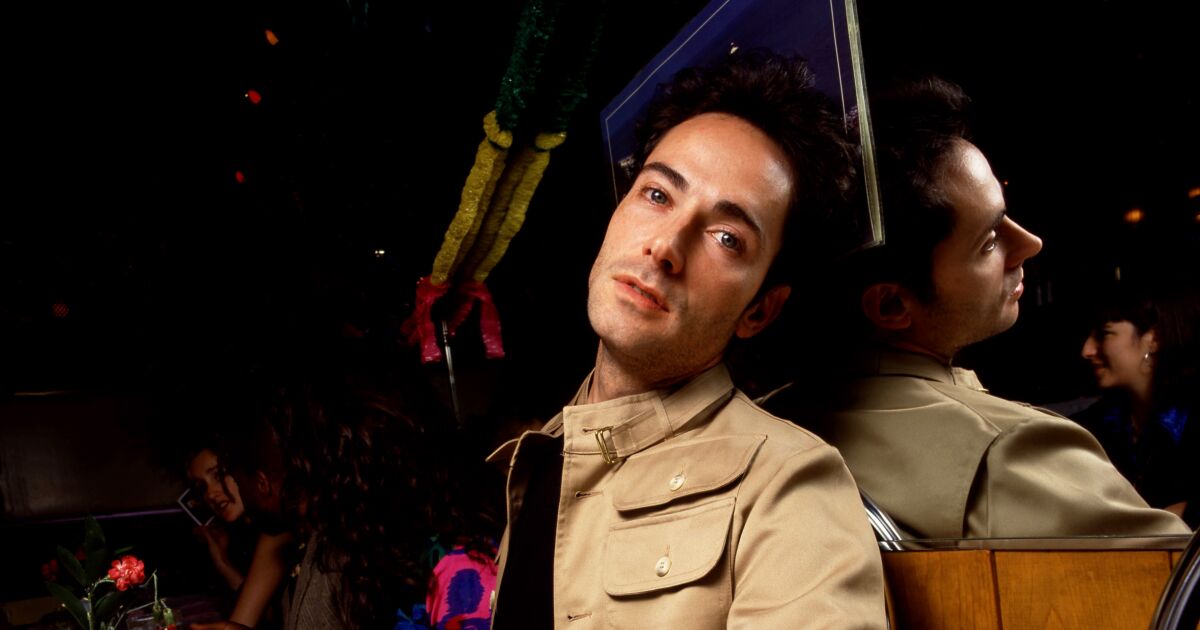John Rowan, the drummer for ’90s Chicago rock band Urge Overkill who performed under the name Blackie Onassis, has died.
A spokesperson for the band confirmed his death to The Times. No cause of death was provided.
Onassis anchored Urge Overkill during their time in the alternative-rock spotlight in the 1990s, playing on the band’s version of Neil Diamond’s “Girl, You’ll Be a Woman Soon,” which was featured in Quentin Tarantino’s “Pulp Fiction” in 1994, and staying with them through their final major-label album, 1995’s “Exit the Dragon.”
A native of Chicago’s South Side, Rowan joined Urge Overkill, the Chicago band led by guitarists Nash Kato and Eddie “King” Roeser, in 1991. With Rowan aboard, Urge Overkill transitioned from practitioners of scuzzy neo-hardcore punk to suave purveyors of refurbished arena rock, playing their crunching riffs with a knowing wink while sporting medallions emblazoned with their “UO” logo. Although he was a late addition to the band, Onassis often summarized Urge Overkill’s appeal better than its founding members, as when he described UO’s mission to Spin magazine in 1992: “We are here to resurrect the era of the swinger — the late ’60s, the playboy life when America was a fun place. The golden era of Vegas, Neil Diamond, moonlight dancing, and Anton La Vey!”
John Rowan, left, and Urge Overkill in 1993.
(Bob Berg / Getty Images)
Kato and Roeser already had made two albums for the indie imprint Touch and Go when Rowan became part of Urge Overkill. Adopting the name Blackie Onassis — he’d later say, “I’m not Blackie Onassis because of my personal life, I’m Blackie Onassis because I drum in Urge. I like being Blackie Onassis; it’s like living in a musical wonderland” — the drummer quickly became central to Urge Overkill’s self-made mythology. “The Supersonic Storybook,” the 1991 album that saw them earn attention outside of Chicago, bore a song called “Today Is Blackie’s Birthday,” which was not only a salute to their new drummer but evidence of a sharpening sense of ironic humor.
Hunkering down in a Humboldt Park bank building they aptly nicknamed “the Bank” — at one point in the early 1990s, all three members lived there — Urge Overkill styled themselves as louche ’70s ladies’ men, a tongue-in-cheek pose that alienated old colleagues like recording engineer and producer Steve Albini. But the makeover started to gain the group positive notice. They befriended Liz Phair, who would later take the name of her 1993 debut, “Exile in Guyville,” from Urge’s kissoff to the Chicago punk scene, “Goodbye to Guyville,” and earned a positive review in Spin for “The Supersonic Storybook”: “The band sounds like the MC5 with Neil Diamond as front man,” the magazine said. Soon, Urge Overkill won such new fans as Nirvana’s Kurt Cobain and Chrissie Hynde of the Pretenders.
Nirvana took Urge Overkill out as a support act on its Nevermind tour in 1991, which led to UO signing with Geffen Records in 1992. The group hired the Butcher Brothers, the hip-hop production unit that helmed hits by Cypress Hill and Kris Kross, to produce its 1993 major-label debut, “Saturation.” A gleaming, oversized celebration of classic-rock tropes, “Saturation” had an alternative-rock hit in “Sister Havana,” which brought UO to the cusp of the mainstream success they craved. When “Pulp Fiction” director Tarantino set a memorable scene, in which Uma Thurman’s character accidentally overdoses on heroin, to Urge Overkill’s cover of Neil Diamond’s “Girl, You’ll Be a Woman Soon,” the group finally had a breakthrough hit.
Heroin started to play a major role in Rowan’s personal life around this time, an open secret in the alternative-rock community. Hole drummer Patty Schemel wrote in her 2017 autobiography “Hit So Hard: A Memoir” that finding heroin in Chicago was “as easy as ordering up a few bags from Blackie Onassis, the drummer of Urge Overkill, who had a regular hookup in town.” Allusions to Onassis’ addiction also surfaced on “Exit the Dragon,” the dark, sprawling 1995 album from Urge Overkill. On the brooding “The Mistake,” Onassis sang, “Be careful what you take, you’ve got a lot at stake / More than you’ll ever know, beware the overdose.”
Shortly after the release of “Exit the Dragon,” Rowan was arrested for heroin possession. While the charges were later dropped, Urge Overkill entered a downward spiral, which led to Roeser leaving the band in 1996. Kato tried to keep the group alive for a while but wound up releasing a solo album, “Debutante,” in 2000 instead. “Debutante” featured six co-songwriting credits from Blackie Onassis.
After “Debutante,” Rowan effectively dropped out of sight. Kato and Roeser reformed Urge Overkill in 2004 without him. While speaking to the Chicago Reader in 2004, the duo alluded to their bandmate’s missed video shoots and concerts, as well as a revoked passport on the eve of a trip to England. At that point, Rowan was living in Los Angeles but was out of contact with Urge Overkill.
Roeser told the Reader, “I don’t have [Onassis’s] phone number. He has mine. Put it that way. He can call me if he wants to. I’ve had the same number for 10 years.”
When promoting Urge Overkill’s second comeback album, “Oui,” in 2022, King said Rowan “really was a third wheel.”
This article will be updated.
This story originally appeared on LA Times

